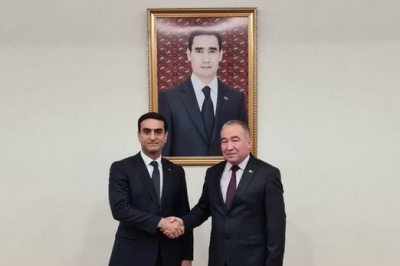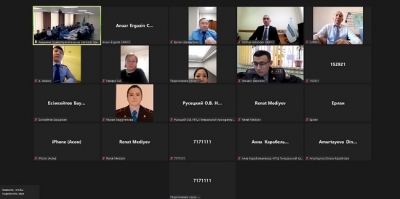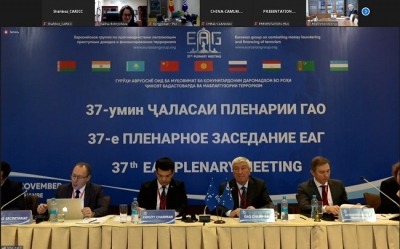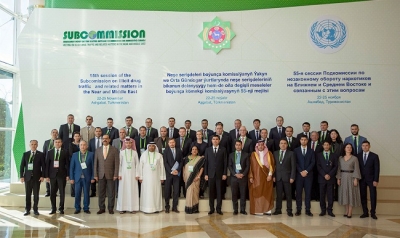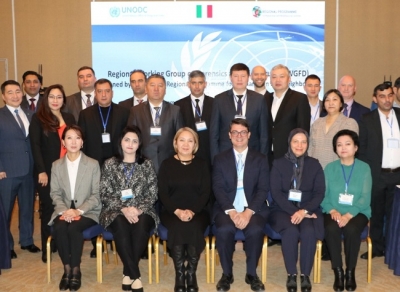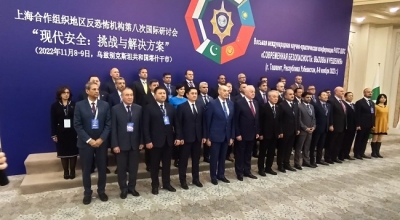Breaking news (528)
About the meeting at the Ministry of Foreign Affairs of Turkmenistan
On November 25, 2022, the meeting of the Director of CARICC A. Yazlyev with the Deputy Minister of Foreign Affairs of Turkmenistan V. Khadzhiev took place in Ashgabat.
The meeting was held as part of the participation of the CARICC delegation headed by the Director in the 55th session of the UN Sub-Commission on Illicit Drug Trafficking and Related Issues in the Near and Middle East (November 22-25, Ashgabat).
During the negotiations, the parties discussed topical issues of interaction between CARICC and the competent authorities of Turkmenistan.
About the participation of CARICC in the International Round Table on the topic: "State-legal mechanisms for countering the narcosis of society"
On November 25, 2022, representatives of the CARICC took part online in an international Round Table on the topic: "State-legal mechanisms for countering the narcosis of society", organized by the Academy of Law Enforcement Agencies under the Prosecutor General's Office of the Republic of Kazakhstan in a hybrid format.
The event was attended by heads and employees of the Prosecutor General's Office, the Ministry of Internal Affairs, the Academy of Law Enforcement Agencies under the Prosecutor General's Office and specialized educational institutions of the Ministry of Internal Affairs of the Republic of Kazakhstan, as well as representatives of the Republic of Belarus and the Kyrgyz Republic.
In accordance with the program of the event, Mr. A.A. Erkaboev, Adviser/Head of the Information and Analytical Department of the CARICC, made a welcoming speech, where he informed the participants of the meeting about the role of the Center in combating international drug trafficking and expressed interest in strengthening cooperation by assisting in the training and advanced training of specialists in countering drug trafficking.
Further, the participants of the round table presented presentations and reports, in particular, on measures taken to improve counteraction to drug crime and drug addiction prevention, problems of drug distribution using digital technologies and the Internet, as well as on the main aspects of detecting and investigating crimes related to illicit drug trafficking.
Following the meeting, the participants stressed the importance of interaction through the expansion of international cooperation, the exchange of positive experience in the fight against drug trafficking and drug addiction prevention, and also developed appropriate recommendations.
CARICC participated in the 37th EAG Plenary meeting
On November 21-25, 2022, meetings of the working groups and the 37th Plenary meeting of the Eurasian Group on Combating Money Laundering and Financing of Terrorism (EAG) were held in a hybrid format, which were attended by representatives of the EAG member states, the FATF Secretariat, as well as the states and organizations - observers of the Group.
On November 21, 2022, the representative of the Central Asian Regional Information and Coordination Center for Combating Illicit Trafficking in Narcotic Drugs, Psychotropic Substances and Their Precursors, Mr. Sh. Komilzoda, took part in the meeting of the Working Group on Typologies and Combating the Financing of Terrorism and Crime, organized via videoconference within the framework of the 37th EAG Plenary meeting.
The Plenary session listened to the 4th progress report of the Kyrgyz Republic with the revision of ratings for technical compliance as part of the 2nd round of EAG mutual assessments and noted the country's progress in improving the AML / CFT system. Rating upgrade agreed on
one of the FATF Recommendations. The next progress report will be presented at the 39th EAG Plenary meeting.
Also, the Plenary approved the Plan for minimizing the identified regional ML/TF risks in the Eurasian region, approved the concept notes and started the following typological studies: under the leadership of the Russian Federation, a project included in the priorities of the Russian EAG Chairmanship, on the topic: “Monitoring the risks of using virtual assets for criminal purposes”, as well as under the leadership of the Republic of India, a project on the topic: “Laundering of criminal proceeds from corruption crimes and crimes against the interests of the public service”.
The plenary session gave a positive assessment to the results of the second International Financial Security Olympiad, which was held at the initiative of the Russian Federation from May to October 2022.
The 38th EAG Plenary Meeting will be held in June 2023 in the Republic of Kazakhstan.
On participation in the 55th session of the UN Sub-Commission on Illicit Drug Trafficking and Related Issues in the Near and Middle East
In accordance with the invitation of the UN Office on Drugs and Crime, the CARICC delegation headed by Director A. Yazlyev takes part in the 55th session of the UN Sub-Commission on Drug Trafficking and Related Issues in the Near and Middle East (November 22-25, Ashgabat ).
During the event, the Director of CARICC met with the Minister of Internal Affairs of Turkmenistan, a member of the Council of National Coordinators of the CARICC member states M. Khydyrov.
At the meeting, CARICC Director A. Yazlyev informed about the main activities of the Center, the results achieved and plans for the near future.
The parties discussed issues of interaction between the competent authorities of Turkmenistan and CARICC through the exchange of information on the drug situation and the fight against cross-border organized drug crime.
Image Gallery
-
 Click to open image!
Click to open image!
Click to open image!
Click to open image!
-
 Click to open image!
Click to open image!
Click to open image!
Click to open image!
-
 Click to open image!
Click to open image!
Click to open image!
Click to open image!
-
 Click to open image!
Click to open image!
Click to open image!
Click to open image!
-
 Click to open image!
Click to open image!
Click to open image!
Click to open image!
-
 Click to open image!
Click to open image!
Click to open image!
Click to open image!
https://caricc.org/index.php/en/publications/news?start=192#sigProId0c4cf3ea07
UNODC-supported forensics and law enforcement platform develops regional NPS response and strengthens drug analysis and investigations in West and Central Asia
On November 8 and 9, 2022, in Astana, Kazakhstan, within the framework of the UNODC Regional Program for Afghanistan and neighboring countries (Regional Program), a regular meeting of the Regional Working Group on Forensics and Illicit Drugs was held. The meeting brought together senior forensic experts and law enforcement officials to share best practices in drug analysis and investigation, as well as to plan regional operations and develop joint regional drug investigations. The meeting was attended by 28 experts and officials from Iran, Kazakhstan, Kyrgyzstan, Pakistan, Tajikistan, Turkmenistan, Uzbekistan, the Central Asian Regional Information and Coordination Centre (CARICC) and representatives of the Laboratory and Scientific Support Section (LSS) of UNODC.
At the meeting, the participants shared information about the drug situation in 2021-2022 and major seizures of drugs, spoke about the activities of national forensic laboratories and drug examinations carried out, as well as about the technical aspects and problems of forensic medical examination of new psychoactive substances (NPS).
As a result of the meeting, the countries made proposals for further strengthening regional cooperation in the field of forensic medical examination and countering drug trafficking, expressed interest in joining the UNODC International Joint Exercises (ICE). Participants stressed the importance and success of the now annual Operation Reflex to counter NPS and synthetic drugs, which is coordinated through CARICC and supported by the UNODC Regional Program. In addition, countries emphasized the need for advanced training courses for forensic experts.
About participation of CARICC delegation at the Conference on Cooperation in the Field of Combating International Terrorism and Extremism
According to invitation of the Executive Committee of the SCO RATS, the delegation of CARICC, consisting of Director A. Yazlyev and Advisor/Head of the Information analytical division A. Erkaboev, took part at the Eighth International Conference on Cooperation in the Field of Combating International Terrorism and Extremism between the SCO Member States and Observer States (November 8-9, 2022, Tashkent).
During the event the issues of national experience and international cooperation in the field of countering terrorism and extremism in the SCO member states were discussed. In addition, measures to counteract the spread of terrorist and extremist ideology and the use of achievements of information and communication technologies for terrorist and extremist purposes were discussed.
During his speech, CARICC Director A. Yazlyev drew attention to the relationship between terrorism and drug trafficking and proposed to intensify the interaction between CARICC and the SCO RATS Executive Committee through the exchange of information and the study of urgent problems on this issue.
Meeting of the Joint Working Group of CARICC and EC RATS SCO
On November 2, 2022, in Almaty, a meeting was held between the Joint Working Group of the Central Asian Regional Information and Coordination Centre for Combating Illicit Trafficking of Narcotic Drugs, Psychotropic Substances and Their Precursors and the Executive Committee of the Regional Anti-Terrorist Structure of the Shanghai Cooperation Organization.
At the meeting, the participants exchanged views on the emerging drug situation in the Central Asian region and Afghanistan in 2021 and the first half of 2022. Topical problems of the relationship between terrorism and drug trafficking, including in the field of financing terrorism with funds obtained from drug trafficking, are considered.
As a result of the event, relevant recommendations were prepared for the competent authorities of the RATS SCO and CARICC member states.
CARICC hosted a regular working meeting of the steering committees established under the component to strengthen border cooperation of the UNODC Program for the countries of Central Asia
On October 27, 2022, on the basis of CARICC, the regular annual working meeting of the steering committees established under the UNODC component of the Border Cooperation Program in Central Asia was held in a hybrid format.
The working meeting was attended by representatives of border agencies, customs services, ministries of internal and foreign affairs of the Republic of Kazakhstan, the Kyrgyz Republic, the Republic of Tajikistan, Turkmenistan, the Republic of Uzbekistan, the Embassy of Japan in the Republic of Kazakhstan, as well as experts from the UNODC Program Offices in Central Asia and CARICC.
During this event, the UNODC Regional Representative for Central Asia, Ms. Ashita Mittal, the Director of CARICC, Mr. Miralizoda Rustam Aziz, and the Ambassador Extraordinary and Plenipotentiary of Japan to the Republic of Kazakhstan, Mr. Jun Yamada, delivered a welcoming speech.
The session was moderated by the International Coordinator of the UNODC Program in Central Asia, Mr. Yusuf Kurbonov.
During the meeting, delegations provided information on the implementation of the UNODC Program component and its impact on the situation in the field of border security and cross-border cooperation in the region, the activities of the established centers for coordination and monitoring of border interaction offices, as well as information on the results achieved, including planned activities provided under the Border Cooperation Component.
As a result of the event, the main priorities of the competent authorities of the Central Asian states to strengthen state borders were identified, recommendations were developed containing regional responses, including a strategy and joint action plans, including the further development of the UNODC Program component using the potential of CARICC.
The participants stressed the importance of interaction through the expansion of international cooperation, the exchange of positive experience and the further development of relations in the field of border security and combating transnational drug crime.
More...
CARICC delegation took part in the annual meeting of the Steering Committee of the United Nations Office on Drugs and Crime Program for the countries of Central Asia for 2022-2025
On October 26, 2022 in Almaty, the CARICC delegation headed by the Acting Director Mr. Yazlyev A.O. took part in the meeting of the Steering Committee of the Program of the UN Office on Drugs and Crime for the countries of Central Asia for 2022-2025.
This meeting was organized by the Regional Office of the United Nations Office on Drugs and Crime in Central Asia with the assistance of the Government of the Republic of Kazakhstan.
The main purpose of the event was to discuss the main achievements of the UNODC Program for Central Asia in 2021-2022, as well as agree on the Work Plan for 2023 under the Program.
The event was attended by heads and employees of prosecution authorities, border agencies, customs services, ministries of internal and foreign affairs of the Republic of Kazakhstan, the Kyrgyz Republic, the Republic of Tajikistan, Turkmenistan, the Republic of Uzbekistan, international partners, donors, as well as experts from the UNODC Program Offices in Central Asia and CARICC.
Welcoming remarks were made by the UNODC Regional Representative for Central Asia, Ms. Ashita Mittal, the First Deputy Minister of Foreign Affairs of the Republic of Kazakhstan, Mr. Kairat Umarov, and the UN Resident Coordinator in Kazakhstan, Ms. Michaela Friberg-Storey.
The experts of the UNODC Program Offices in Central Asia presented the project Action Plans for 2023 for the implementation of the five components of the UNODC Program for the countries of Central Asia for 2022-2025.
In addition, the participants and heads of delegations presented presentations and reports on the main areas of cooperation with UNODC, in particular, the provision of advisory and logistical assistance, including the organization of training seminars and training sessions for employees of the competent authorities in the region, as well as a number of proposals for consideration and their possible inclusion in the draft UNODC 2023 Action Plan.
The participants emphasized the importance of interaction through the expansion of international cooperation, the exchange of positive experience and the further development of relations in the field of combating transnational organized crime.
Image Gallery
https://caricc.org/index.php/en/publications/news?start=192#sigProId4482ae9256
Working meeting with a representative of the UN Security Council Monitoring Group
On October 25, 2022, the Central Asian Regional Information and Coordination Center for Combating Illicit Trafficking of Narcotic Drugs, Psychotropic Substances and Their Precursors (CARICC) hosted a meeting of CARICC staff with the expert of the Monitoring Group for Analytical Support and Enforcement of Sanctions of the UN Security Council Mr. Ashetov Talgat.
Analysts of the Information and Analytical Division, Mr. Anuar Yergazin and Mr. Avazzoda Barzu, as well as a specialist of the Division to coordinate international operations, including controlled deliveries, Mr. Elzod Rakhmatov, took part from CARICC.
During the meeting, the parties exchanged information on the ongoing work to combat drug trafficking, including in terms of the latest trends taking place on drug trafficking routes from Afghanistan, as well as countering terrorism.
In addition, CARICC analyst Mr. Avazzoda Barzu showed a presentation on the topic: “The drug situation in Afghanistan and Central Asian countries in 2021”.
The meeting participants also discussed a number of current and future issues which are in the mutual interest.
About participation of the CARICC delegation in Paris Pact Expert Working Group meeting on Precursors
The delegation of the CARICC headed by the Director of the CARICC, Major General of Militia Miralizoda Rustam Aziz participated in the Paris Pact Expert Working Group meeting on Precursors, which took place on October 24-25, 2022 in Bucharest, Romania.
The meeting reviewed current trends, routes and methods of smuggling precursor chemicals used in the production of heroin and methamphetamine.
Director of CARICC informed about the latest trends in seizures of narcotic drugs, psychotropic substances and their precursors in Central Asia. He drew attention to the growth of drug production in Afghanistan, which is confirmed by the increase in seizures of narcotic drugs, psychotropic substances and their precursors in the CARICC member States. He noted that the analysis of trends in the development of the drug situation in the space of the CARICC member states predicts its further development.
In order to intensify measures to prevent the illicit trafficking of precursors in the region and their supply to Afghanistan, Director of CARICC proposed a number of recommendations:
- Conducting training courses for law enforcement officers of the region on the identification and suppression of illicit trafficking in precursors.
- Establishment of close regional and international cooperation in the fight against illicit trafficking of precursors, including within the framework of the Regional Operation "Substitution".
- Regular exchange of information in real time between competent authorities for an efficient response and prevention of leaks of chemical precursors.
- Establishing interaction of law enforcement agencies with firms/manufacturers of precursors to prevent leakage of precursors.
- Organization of trainings on control delivery operations of precursors in Central Asia with the participation of the competent authorities of the CARICC member States.
- Strengthening control measures over the production (import/export/transit) of precursors in order to prevent their illegal import into Afghanistan.
At the end of the meeting, participants adopted the recommendations of the Paris Pact working group of experts on precursors.
Image Gallery
https://caricc.org/index.php/en/publications/news?start=192#sigProId6f15b9ce4c
On the participation of CARICC in the eleventh session of the UNTOC Conference of Parties
From October 17 to 21, 2022, the 11th session of the Conference of the Parties to the United Nations Convention against Transnational Organized Crime (UNCT) took place in a hybrid format, at which about 1,500 participants from 131 countries, including 22 international organizations and 193 civil society organizations, registered.
At this event in an online format, CARICC analyst Komilzoda Sh. took part.
Ms. Gada Wali, Executive Director of the United Nations Office on Drugs and Crime, addressed the participants of the event with a welcoming speech.
In her presentation, the representative of UNODC emphasized that “UNOCT and its Protocols are powerful tools for building the resilience of States and societies to crime. It's time to step up their implementation."
The event considered a number of thematic resolutions, including the implementation of provisions on international cooperation, technical assistance to prevent and combat transnational organized crime that damages the environment.
Among other thematic issues, the Conference of the Parties considered strengthening international cooperation in combating all forms of transnational organized crime, including human trafficking, smuggling of migrants, trafficking in firearms, cybercrime, financial and environmental crimes.
The participants exchanged views, stressed the importance of close international cooperation in combating transnational organized crime and terrorism between law enforcement agencies and international partners.

